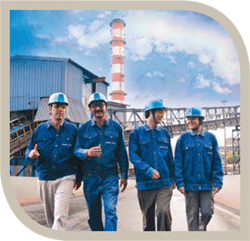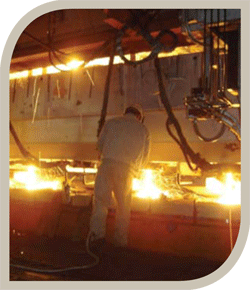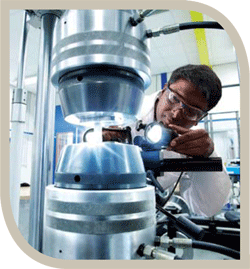 |
|
Strategy at Tata Steel is driven by continuous efforts to stay alert to changing market requirements and to respond through initiatives that drive change. India: Creating long-term value Kar Vijay Har Shikhar – Continuous improvement programme Kar Vijay Har Shikhar ("KVHS") is a fast paced, analytics based process with in-built rigour and review systems. The methodology is a well-defined six step process involving TQM and statistical tools. Some of the key themes through which improvements are taken up are – Throughput, Value-in-use, Energy Efficiency, Opportunistic Plays, Logistics & Supply Chain. Last year, KVHS was effectively launched in marketing and sales for the Indian operations. In the current financial year, the primary focus was on mines and production processes in India. Through KVHS, several innovative and breakthrough projects were launched including, several 'first time' ideas in Tata Steel – Load Haul Dumpers at Jharia Mines, Synthetic Collector for improving Clean Coal yield, Excavator Hanger at West Bokaro, Desiliconisation trials at Blast Furnaces, TBD Resleeving Machine at LD#1(first time in Asia), Quick Tap Drop System at LD#1, Seven Roll Feeder installation at SP#3, Micropelletisation of Super Fines for use in Sinter Making, Paving Bricks from LD Slag. Some of these have been implemented while others are in trial phase. Sustainability has been recognised as a critical area for overall improvement, hence sustainability activities like mine life, solid waste utilisation and energy efficiency have been added to the portfolio of initiatives under KVHS. The KVHS journey has been a balanced mix of activities for EBITDA maximisation, process improvement, innovation and capability building. Going forward, the KVHS group has the responsibility of finding avenues for improved cash flow which remains a challenge for the Group. Branded product portfolio Tata Steel has been a pioneer in de-commoditising and branding steel for over a decade now in India. The existing portfolio of Tata Steel's brands spans sectors that include construction (Tata Tiscon and Tata Structura), roofing (Tata Shaktee), panels & furniture (Tata Steelium and Galvano) and agricultural implements (Tata Agrico). These brands, put together, contribute ~30% to the top line of the Company. 
Moving towards a common vision, Jamshedpur, India "Tata Astrum", the brand for Hot Rolled (HR) Sheets and Coils, is the latest offering from the Company's stable. This is the first time the Company has made a foray into branding of HR steel. In line with the capacity expansion plans, a pan-India market mapping exercise was carried out to understand the consumption pockets, patterns and needs of the customers for HR steel. The Company identified this segment as an Emerging Corporate Account (ECA) with a requirement for small tonnages. In order to better understand the needs of the segment, a structured pilot programme called Emerging Corporate Value Management (ECVM) was launched. As an outcome of this, the Company mapped 4,500 customers falling into 37 application based segments and appointed 47 distributors to serve them. "Tata Astrum" is being supplied to customers in processed form from service centres, which have a tie-up with distributors and conform to the Tata Steel quality standards. "Tata Astrum" expects to grow its market share in this segment in the future. Tinplate and Tata Sponge In continuation of growth efforts, Tata Steel made successful open offers to increase its stake in Tinplate Company of India Ltd (TCIL) by 14% and Tata Sponge Iron Ltd (TSIL) by 11.26% respectively. Pursuant to these open offers, TSIL has become a subsidiary of the Company. TCIL is today the largest producer of tin coated and tin free steel sheets for the packaging industry in India, with a capacity of 379,000 tonnes per annum. TSIL is a manufacturer of sponge iron with an installed capacity of 390,000 tonnes per annum and a power producer with generating capacity of 26 MW. TSIL is also developing coal blocks in Angul, Odisha and is continuing with its efforts to improve its upstream synergies, providing a platform for alternate steel making in the future. Europe: Elements of Strategy "To be the long-term preferred partner in our chosen markets by unlocking the potential of steel". This is the mission that Tata Steel in Europe has defined for itself in order to fully contribute to the Group’s vision. As part of the mission, five key strategic priorities have been identified:
The Company invests significantly in the up-skilling and development of its employees. Restructuring initiatives During the year the operations in Europe also undertook several restructuring initiatives.
NatSteel: Improvement plans In the current financial year, NatSteel initiated several measures to achieve its strategic objectives. These initiatives coupled with strong demand in Singapore led the Company to return its best ever performance in the last 10 years.
Tata Steel Thailand: Strategic approach Tata Steel Thailand is adopting a comprehensive strategy to improve its performance. The plan is as follows:
Raw Material Strategy Raw material integration is a strategy, pursued by the Company since inception. Securing raw material linkages, has assumed greater importance, given the volatility that exists in the raw material prices today. Iron ore and coking coal are two basic raw materials required for manufacturing steel. Access to raw materials through our investment provides stability in terms of quality and availability and provides a hedge against volatile prices. The Company has made the following investments in overseas raw material projects: 
A strategic approach at Tata Steel Thailand Benga Coal Project: Mozambique Tata Steel partners Rio Tinto in the Benga project, located in the Moatize basin of Mozambique. The Company holds 35% equity stake and is entitled to 40% off-take of coking coal produced in the project. The project started producing coal and made its first shipment in June 2012. The project is planned in phases. The full ramp up of Phase 1 is expected to produce 5.3 mtpa Run of Mine (ROM) coal (1.5 mtpa clean coking coal and 0.9 mtpa thermal coal). Iron Ore Project: Canada Tata Steel through its subsidiary Tata Steel Minerals Canada Limited (TSMC) is developing the Direct Shipping Ore (DSO) project in Canada. The Company holds 80% equity stake in TSMC with the balance 20% equity stake held by New Millennium Iron Corporation (NML), a Canadian listed mining company. Direct Shipping Ore project successfully completed trial production in 2012 with initial mining and dry processing of ~63% Fe grade iron ore. TSMC is targeting production of 1 million tonnes of iron ore in Financial Year 2013-14. The production is expected to be ramped up to about 6 mtpa. Tata Steel in March 2013 entered into a framework arrangement through TSMC with Labrador Iron Mines (LIM) for the acquisition of a 51% stake in LIM's Howse deposit to exploit significant synergies that exist between the two mine deposits. Iron ore produced in Canada is meant to partially integrate the Company's European operations. |

- Management
- |
- Financial Highlights
- |
- Integrated Reporting
- |
- NVG Principles
- |
- Directors' Report
- |
- MDA
- |
- Financials
- Balance Sheet
- Profit & Loss Account
- Cash Flow Statement
- Notes
- Auditors' Report on Consolidated Financial Statements
- Consolidated Balance Sheet
- Consolidated Statement of
Profit and Loss - Consolidated Cash Flow Statement
- Notes to Consolidated Balance Sheet and Statement of Profit and Loss
- Attendance Slip and Proxy Form
- The Deming Grand Prize
- |
- Notice
- |
- Downloads
Home  Integrated Reporting Integrated Reporting  Strategic Objectives and Strategies Strategic Objectives and Strategies
|
| Strategic Objectives and Strategies |

